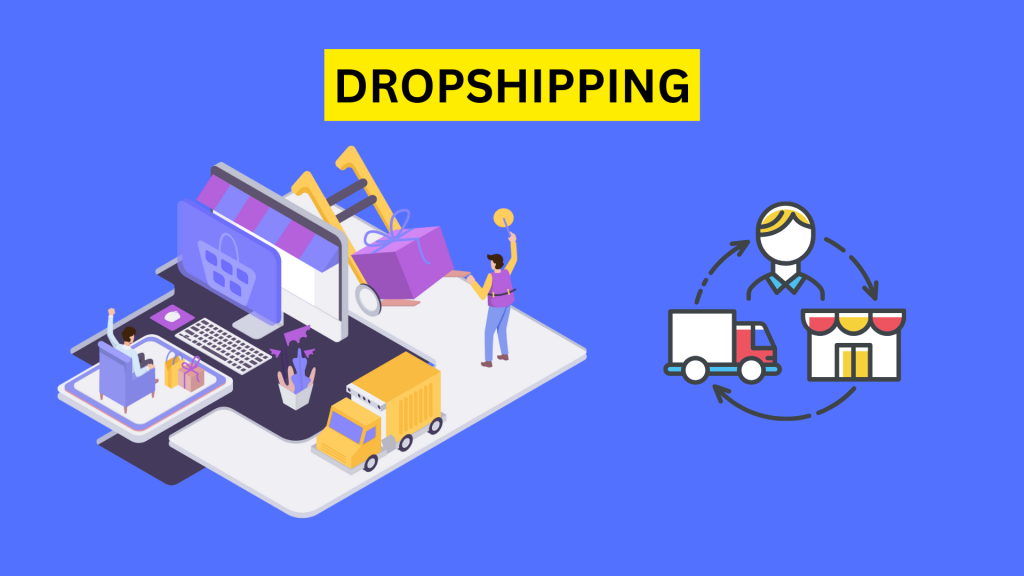Dropshipping vs. affiliate marketing, are two popular online business models that offer individuals and entrepreneurs distinct ways to generate income in the ever-expanding world of e-commerce. While both approaches allow you to tap into the vast potential of online sales without the need to hold physical inventory, they differ significantly in their execution and revenue generation strategies. In this comparison, we will explore the key differences and similarities between dropshipping vs. affiliate marketing, helping you better understand which model might be the best fit for your entrepreneurial ambitions and goals.
What is Dropshipping?

Dropshipping is an e-commerce fulfillment model where a business doesn’t keep the products it sells in stock. Instead, it purchases products from a third party, usually a wholesaler or manufacturer, and has them shipped directly to the customer. The drop shipper acts as an intermediary, marketing, and selling products without the need to invest in inventory or manage shipping logistics.
How Does Dropshipping Work?
To embark on a dropshipping venture, here are the basic steps involved:
- Select a Niche: Determine the niche or product category you want to focus on. Research and identify products with demand and profit potential.
- Find Suppliers: Establish partnerships with reliable suppliers who are willing to dropship their products. Platforms like AliExpress and SaleHoo are popular choices.
- Set Up an Online Store: Create an e-commerce website or use platforms like Shopify, WooCommerce, or BigCommerce to set up your store.
- List Products: Import product listings from your suppliers to your online store. Optimize product descriptions and images for conversions.
- Market Your Store: Implement digital marketing strategies such as SEO, social media marketing, and paid advertising to drive traffic to your store.
- Process Orders: When a customer places an order, forward it to your supplier, who will then handle the shipping and delivery.
- Customer Service: Provide customer support, handle returns, and manage inquiries.
Advantages and Disadvantages of Dropshipping
| Advantages of Dropshipping | Disadvantages of Dropshipping |
|---|---|
| 1. Minimal upfront capital required. | 1. Low profit margins due to competition. |
| 2. Freedom to experiment with products. | 2. Reputation relies on suppliers. |
| 3. Easily scale up by adding more products. | 3. Tracking stock levels can be complex. |
| 4. Manage business from anywhere. | 4. Limited control over product quality. |
| 5. Eliminate logistical challenges. | 5. Limited control over shipping times. |
What is Affiliate Marketing?

Affiliate marketing is a performance-based marketing strategy in which individuals or businesses (affiliates) promote products or services of other companies (merchants) and earn commissions for successful referrals or sales. It operates on the principle of revenue sharing, making it a collaborative effort between affiliates and merchants.
How Does Affiliate Marketing Work?
The fundamental steps in affiliate marketing are as follows:
- Join Affiliate Programs: Affiliates sign up for affiliate programs offered by merchants. These programs provide unique affiliate links or tracking codes.
- Promote Products or Services: Affiliates use their marketing channels, such as websites, blogs, social media, email marketing, or YouTube, to promote the merchant’s products or services.
- Drive Traffic: The goal is to attract potential customers to click on the affiliate links and visit the merchant’s website.
- Earn Commissions: When a referred visitor makes a purchase or takes a specific action (e.g., signing up for a newsletter), the affiliate earns a commission.
Advantages and Disadvantages of Affiliate Marketing
| Advantages of Affiliate Marketing | Disadvantages of Affiliate Marketing |
|---|---|
| 1. Affiliates don’t need to create products. | 1. Fierce competition in many niches. |
| 2. Access to diverse product offerings. | 2. Rules and policies impact commissions. |
| 3. Ability to generate income passively. | 3. Varying commission structures. |
| 4. Minimal overhead costs focused on marketing. | 4. No control over product quality, pricing, or availability. |
Dropshipping vs. Affiliate Marketing
| Aspect | Dropshipping | Affiliate Marketing |
|---|---|---|
| Ownership and Product Handling | You own an online store and sell physical products. However, you don’t hold inventory or handle fulfillment. | You don’t own products or an online store. You promote products/services for other companies (merchants). |
| Investment and Costs | Requires investment in setting up a website, marketing, and potentially product samples. Additional costs may include customer service and advertising. | Lower initial investment, primarily focusing on domain registration, hosting, and marketing expenses. |
| Product Selection and Control | You have control over product selection, pricing, and branding. | You have no control over the product’s quality, pricing, or availability. |
| Revenue Generation | Earn revenue from the sale of physical products with potentially higher revenue per sale. | Generate income through commissions, typically with lower revenue per sale but higher profit margins. |
| Responsibilities | Responsible for order processing, customer service, and managing supplier relationships. | Primarily responsible for marketing and promotion, with no involvement in product ownership or fulfillment. |
| Scalability | Scales by adding more products or expanding your store. | Scales by increasing reach and audience through marketing efforts. |
| Risk and Reward | Higher financial risk due to inventory investment. Potential for higher profits per sale. | Lower financial risk due to minimal upfront investment. Potential for passive income over time. |
| Control Over Customer Experience | Limited control over shipping times and customer experience. | No control over the customer’s experience on the merchant’s website. |
| Competition | Faces competition in the e-commerce marketplace. | Faces competition in affiliate marketing niches. |
| Location Independence | Allows for location-independent management. | Allows for location-independent management. |
Which of The Two, Dropshipping or Affiliate Marketing, is More Profitable?
Determining which between dropshipping and affiliate marketing is more profitable can be challenging as it depends on various factors. Profitability in dropshipping largely hinges on your ability to choose the right products, manage pricing effectively, and drive substantial sales volume. While dropshipping can yield higher revenue per sale, profit margins tend to be slimmer due to product costs and competition. Success in dropshipping often requires a significant sales volume to generate substantial income.
Get exclusive access to all things tech-savvy, and be the first to receive
the latest updates directly in your inbox.
On the other hand, affiliate marketing can also be profitable, with the advantage of potentially higher profit margins. Successful affiliate marketers can earn commissions on sales without the burden of handling inventory, customer service, or order processing. However, the earnings in affiliate marketing may take time to accumulate, as it relies on building a loyal audience and driving traffic to the merchant’s website.
Ultimately, the profitability of dropshipping or affiliate marketing depends on your skills, niche selection, marketing strategies, and dedication. It’s crucial to evaluate your strengths and preferences to determine which model aligns better with your goals.
Enhancing Income Through Dropshipping Versus Affiliate Marketing
Increasing your earnings in dropshipping and affiliate marketing requires strategic approaches tailored to each model:
Dropshipping
- Expand Product Catalog: Continuously research and add new products or niche categories to attract a wider audience.
- Optimize Pricing: Regularly review and adjust your pricing to maintain competitive yet profitable rates.
- Improve Customer Experience: Provide excellent customer service, quick response times, and hassle-free returns to build trust and encourage repeat business.
- Marketing Strategies: Invest in effective digital marketing, including SEO, paid advertising, and social media campaigns, to drive more traffic and sales.
- Scaling Up: As your business grows, consider expanding into additional sales channels, such as selling on multiple e-commerce platforms.
Affiliate Marketing
- Niche Selection: Focus on niches with high-converting products and where you have expertise or a strong online presence.
- Content Creation: Produce high-quality, informative content that resonates with your target audience and encourages them to click on your affiliate links.
- Audience Building: Grow your audience through content marketing, SEO, email marketing, and social media to increase your potential reach.
- Diversify Promotions: Promote a variety of products within your niche to maximize earnings potential.
- Analyze and Optimize: Regularly analyze your affiliate marketing metrics and optimize your strategies based on what works best for your audience.
Both models require dedication, continuous learning, and adaptation to stay competitive and increase earnings over time.
Which Option Offers Simplicity Dropshipping or Affiliate Marketing?
When it comes to ease of entry and operation, affiliate marketing often has the advantage. Here’s why:
- No Inventory Management: In affiliate marketing, you don’t deal with inventory, which eliminates the complexities of tracking stock levels, restocking, and handling returns.
- Lower Financial Risk: Affiliate marketing requires minimal upfront investment compared to dropshipping, which may involve expenses for setting up an online store and purchasing products.
- Simplified Operations: As an affiliate marketer, your primary focus is on marketing and promoting products, making it a straightforward business model.
- No Customer Service Obligations: Affiliates are not responsible for customer service, whereas drop shippers must address customer inquiries, issues, and returns.
However, ease of entry doesn’t necessarily mean affiliate marketing is easy to master. Success in affiliate marketing still requires effective marketing strategies, content creation, audience building, and understanding the affiliate programs you join.
Dropshipping, while more complex in terms of inventory management and order processing, can also be manageable with the right tools and strategies. It offers more control over product selection and branding but comes with its own set of challenges, including supplier relationships and shipping logistics.
FAQs – Dropshipping vs. Affiliate Marketing
How Can I Enhance Earnings in Dropshipping?
To increase earnings in dropshipping, consider expanding your product catalog, optimizing pricing, improving customer experience, implementing effective marketing strategies, and scaling your business.
Which Option Offers Simplicity, Dropshipping, or Affiliate Marketing?
In terms of ease of entry and operation, affiliate marketing is often considered simpler due to its lower financial risk, absence of inventory management, simplified operations, and no customer service obligations. However, success in either model requires dedication and effective strategies.

Which Is More Profitable, Dropshipping, or Affiliate Marketing?
The profitability of dropshipping and affiliate marketing depends on various factors, including niche selection, marketing strategies, and dedication. There’s no definitive answer, as both models have their potential for profit.
How Long Does It Take to See Profit in Dropshipping?
The time it takes to see profit in dropshipping varies widely. It depends on factors like niche selection, marketing effectiveness, and your ability to attract and convert customers. Some entrepreneurs see profit within a few months, while others take longer.
What Are Some Effective Affiliate Marketing Strategies for Beginners?
Effective affiliate marketing strategies for beginners include creating quality content, building an email list, engaging on social media, and focusing on products or services you are passionate about and knowledgeable in.
Wrapping Up
In conclusion, both dropshipping vs. affiliate marketing offer unique opportunities to thrive in the ever-evolving landscape of online commerce. While dropshipping allows you to own and control your online store, providing the potential for higher revenue per sale, it also involves more significant responsibilities and financial risks. On the other hand, affiliate marketing offers a simpler entry point, lower financial risk, and the potential for passive income, but it relies heavily on effective marketing and audience-building efforts.
To make the right choice, carefully assess your skills, resources, and aspirations. Consider what appeals to you most – the control and ownership of a dropshipping business or the simplicity and collaboration of affiliate marketing. Whichever path you choose, success in e-commerce demands dedication, continuous learning, and a commitment to adapt and evolve as the online business landscape changes. With the right strategy and perseverance, you can find success and fulfillment in either of these rewarding online business models.
Related Sources:



